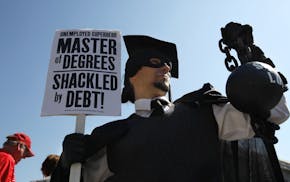When one of his biggest customers went bankrupt, Corby Pelto allowed himself to entertain the notion that the court-appointed trustee overseeing the case might help his Minneapolis-based insurance services firm recover some of the $18,000 Pelto was still owed.
Imagine his dismay, then, when Pelto found himself on the receiving end of a court-sanctioned shakedown that ended only after he agreed to fork over $5,000 last month.
"I'm still trying to figure out how a small-business person who was just doing his job ends up paying for the misdeeds of others," Pelto said.
Some version of that same question is running through the minds of a lot of small-business owners these days, thanks to the sharp increase in business bankruptcies since 2008. My Star Tribune colleague David Phelps recently highlighted the plight of 138 contractors, vendors, suppliers and others who did business with Home Valu, the home remodeling retailer that went bankrupt 18 months ago.
All of them lost a major customer, which is bad enough during a recession. Worse, many of them had not been paid for work they'd already completed. The topper arrived in the mail two weeks ago: a letter warning them that they'd be sued unless they voluntarily returned a total of $3.9 million they had been paid for work they did on behalf of Home Valu.
What exactly did they do wrong? Nothing, and if you don't believe me, take bankruptcy trustee Timothy Moratzka's word for it.
"We recognize that you did nothing wrong in receiving payment on account of legitimate obligations that the debtor owed you," he wrote.
Home Valu was one of Sergey Vyalkin's biggest floor installation customers. The Brooklyn Park resident says he was owed hundreds of thousands of dollars -- money he'd already paid to his crews -- when Home Valu closed its doors. Its bankruptcy cost Vyalkin "almost everything," he said, including his house.
Now the trustee wants more. Exactly how much Vyalkin would rather not say publicly, other than it being in the mid-five figures. Moratzka was not available to comment.
According to the American Bankruptcy Institute, more businesses went bankrupt in the past three years than in the preceding five. The total in 2009, 60,837, was the highest since 1993. As a result these pay-up-or-else demands are being invoked more often through a section of the bankruptcy code known as the preference statute.
This statute is supposed to protect all creditors by giving the trustee the power to recover any payments that a debtor may have made to favorite or preferred vendors in the weeks leading up to a bankruptcy filing.
In practice, though, the trustee doesn't have to prove any special treatment in order to demand repayment. It's up to the vendor to prove that he or she was not preferred, and that could mean mounting an expensive and complicated defense.
"Unfortunately, a lot of these companies are small businesses that have been badly hurt by the bankruptcy of their customer," said Blake Nelson, a Twin Cities area construction attorney. "They can't afford what the trustee wants, but they can't afford to defend themselves in court, either."
That's the box Pelto found himself in.
His company, Pelto Group, provides insurance claims services for trucking firms around the country, including Gainey Transportation in Michigan. Its bankruptcy in late 2008 took Pelto completely by surprise, and ultimately forced him to lay off a couple of employees. Two years later, just as his business was beginning to recover, the bankruptcy trustee sent a letter demanding that he repay the $31,298 he'd been paid for work done during the summer of 2008.
Pelto refused to pay and hired a lawyer after the trustee sued.
And the shakedown began.
During the first call with Pelto's attorney, the trustee reduced the amount to $15,000. In subsequent conversations she trimmed it again, to $10,000. They finally settled at $5,000.
"It appeared to me to be nothing more than legalized extortion to see how much I would pay," Pelto said.
In the Home Valu case, Moratzka's letter to vendors and others offered to make their headache go away for 80 percent of the total claim. A couple of creditors who've called said they've been told the trustee would settle for 50 percent of the claim. Vyalkin said he was told he could settle for $9,800.
All perfectly legal, of course. But that doesn't make it right.
ericw@startribune.com • 612-673-1736

Wieffering: Time to get over debit card fees
For Thrivent and others, warnings were there

With billions in sales, some co-ops are big business

